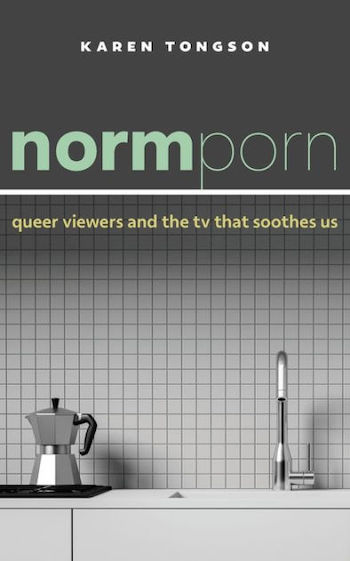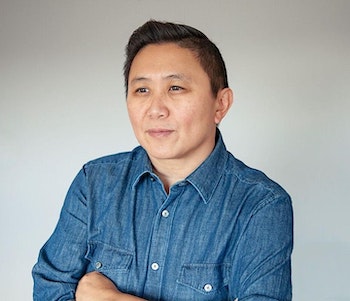Book Review: “Normporn” — Yearning for the Impossible Middle
By Steve Erickson
The cultural critic’s wrestling with the compromises that the pleasures of mass culture inevitably demand is heartfelt. In a word, it’s normal.
Normporn: Queer Viewers and the TV That Soothes Us by Karen Tongson. NYU Press, 216 pages.
 Normporn is a collection of essays about television, but the volume kicks off with Joe Biden’s inauguration in 2020. Just as James Poziewonik’s Audience of One claimed that Trump was a creation of TV, Normporn sees the Clintons, Obama, and Biden as archetypes of optimistic, middle-of-the-road liberalism. Critic Karen Tongson doesn’t analyze the politicians themselves, but muses on TV shows that are infused with the same ideology. In a 2015 essay, she defines the title’s term “normporn.” She traces it to the 1987 debut of thirtysomething, a dramedy whose appeal was rooted in its “comforting smoothness.” Normporn revolves around the white, heterosexual family in a domestic setting, but its leaves a certain amount of space open for people of color and/or LGBTQ people. (The critic views the vampire-themed True Blood as a partial critique of normporn. Gilmore Girls, Parenthood and This Is Us slot snugly into place.) On the one hand, Tongson gloms onto these shows’ hypocrisies and assimilationist tendencies. On the other, she doesn’t count herself exempt from the same attitudes. A lesbian whose parents immigrated from the Philippines to the U.S. when she was a child, Tongson often turns to normporn for relief in a country whose cruelty has grown increasingly unapologetic to the marginalized. Entertained as she is, the critic is acutely aware of the limits reality sets for people like her.
Normporn is a collection of essays about television, but the volume kicks off with Joe Biden’s inauguration in 2020. Just as James Poziewonik’s Audience of One claimed that Trump was a creation of TV, Normporn sees the Clintons, Obama, and Biden as archetypes of optimistic, middle-of-the-road liberalism. Critic Karen Tongson doesn’t analyze the politicians themselves, but muses on TV shows that are infused with the same ideology. In a 2015 essay, she defines the title’s term “normporn.” She traces it to the 1987 debut of thirtysomething, a dramedy whose appeal was rooted in its “comforting smoothness.” Normporn revolves around the white, heterosexual family in a domestic setting, but its leaves a certain amount of space open for people of color and/or LGBTQ people. (The critic views the vampire-themed True Blood as a partial critique of normporn. Gilmore Girls, Parenthood and This Is Us slot snugly into place.) On the one hand, Tongson gloms onto these shows’ hypocrisies and assimilationist tendencies. On the other, she doesn’t count herself exempt from the same attitudes. A lesbian whose parents immigrated from the Philippines to the U.S. when she was a child, Tongson often turns to normporn for relief in a country whose cruelty has grown increasingly unapologetic to the marginalized. Entertained as she is, the critic is acutely aware of the limits reality sets for people like her.
Tongson pivots back and forth throughout the book, incisively dissecting TV series and then offering detailed descriptions of her own emotional reactions. She admits to crying jags, especially during This Is Us. The result is that, sometimes from paragraph to paragraph, Tongson’s tone veers jarringly between exposes of these shows’ ideological flaws and confessions of Tongson’s devotion to them. This is a guilty critic: she finds herself attracted to media with whose politics she disagrees. (To be fair, she devotes a chapter to the futility of searching for an alternative culture, the fantasy of mainstream programming that resists co-option.) This mix of memoir and cultural criticism resists comfortable closure, but in this see saw appraisal is the stronger. Today, sophisticated taste is defined (for many) by how it values highbrow and lowbrow art. The latter is seen as the former in disguise. The middlebrow is only worthy of scorn. Normporn is a book about Tongson’s unease with breaking out from that categorization because she finds herself moved by thirtysomething and This Is Us. She defines the appeal of these shows: “We are admitting to our own complicity with and perhaps even our latent desires for an impossible middle — for something middling and even potentially middlebrow… What is normporn if not the political stagecraft I just described {the inauguration of Biden and Kamala Harris}, but fictionalized for our consumption?”
Tongson does a fine job of connecting the TV shows she analyzes with the political climate of their times. For example, her chapter on thirtysomething explores how the show didn’t fit into ’80s perceptions of TV as a bland wasteland. (It was the first TV show of that decade with a central character who was explicitly Jewish.) Rather than catering to a broad demographic, thirtysomething was about its own audience: upwardly mobile, college-educated urbanites like creators Marshall Hershkovitz and Edward Zwick. (Their defensive quotes about how the show dealt with class are damningly naïve.) The program also navigated the ironic transition between the Reagan and Clinton eras. She argues that the show was “‘neoliberal’ when the term was used only sparingly, the tentative solutions thirtysomething offered for the world’s social injustices sprung from individual self-reflection and efforts at self-betterment.” Despite this, she supplies a generous glimpse of the show’s artistic achievements, devoting several pages to the narrative strategies of the episode “Second Look,” which initially dwells on apparent banalities in order to tease a character’s death in a car accident. She closes the chapter on thirtysomething by praising this deeply moving dramatic treatment of mortality, a nuanced approach that rings true to her experiences of learning about her friends’ deaths.

Cultural critic Karen Tongson. Photo: courtesy of the artist
She reads True Blood as an allegory for the mainstreaming of queer life and the assimilationist impulses that led to the acceptance of same-sex marriage. Its creator, American Beauty screenwriter Alan Ball, is a gay man, and his narrative of vampires suddenly revealing their existence to the human race mirrors the political tensions as of its period. Its fictional PSAs from the American Vampire League, in which Alexander Skarsgard’s character described himself as a “tax-paying American and small business owner in the great state of Louisiana who also happens to be a vampire,” reproduced the rhetoric of the time’s pro-same sex marriage ads. Tongson presents this mirroring as a rare moment in which the system critiqued itself. In fact, it is a dissection of normporn itself. But for her the show’s final episode was a betrayal: “a hard sell on the ‘normal’ life” that overlooks the backlash which would come after same-sex marriage was legalized.”
Tongson cared enough about Gilmore Girls to beg her wife to pay for the tickets for a tour of Warner Brothers’ backlot construction of its set. She wishes she could say she hated but experience, but confesses she dropped 50 bucks on fast food there. The show comes in for some of her harshest criticism: she ties its refusal to depict abortion with the Supreme Court’s recent gutting of Roe v. Wade. (The show’s approach was the aesthetic version of “safe, legal. and rare” rhetoric.) About a promo for This Is Us, Tongson writes “I hated how blatantly I was being manipulated, but hated myself for the fact that I couldn’t stop watching.” She analyzes the use of close-ups in its first episode, noting how they are used to divert attention from the setting and to downplay its characters’ connections. Still, she praises This is Us not attempting to tie up politically challenging loose ends: “Even more significantly, the series manages to decenter the white family, and its response to “difference” and adversity, furnishing us instead with a sustained view of the Black Pearsons as a rupture to and extension of the normporn universe.” This Is Us refused to cast people of color to the side or act as though they can be easily incorporated into a white family.
Tongson’s approval of This Is Us closes the door on normporn during the Trump administration. It is also emotionally cathartic: she finally makes peace with the TV she loves. Although her torment over being drawn to what she hates is laid on a bit thick, the critic’s wrestling with the compromises that the pleasures of mass culture inevitably demand is heartfelt. In a word, it’s normal.
Steve Erickson writes about film and music for Gay City News, Slant Magazine, the Nashville Scene, Trouser Press, and other outlets. He also produces electronic music under the tag callinamagician. His latest album, The Bloodshot Eye of Horus, was released in November 2022, and is available to stream here.
